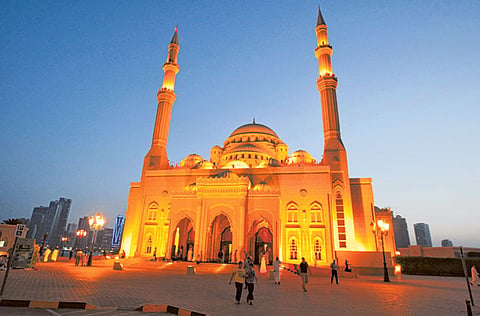Mosques to lead in water and electricty conservation
Mosques to lead in water and electricty conservation

Sharjah: Mosques are leading the way in conserving water and electricity in Sharjah.
Sharjah Islamic Affairs and Sharjah Electricity and Water Authority (Sewa), have launched a joint initiative to educate people and organisations in the emirate to conserve water and electricity and follow green standards by using mosques as model buildings.
Shaikh Saqr Bin Mohammad Al Qasimi, Chairman of Sharjah Department of Islamic Affairs, said that the mosque as a model building emphasises their role in societal awareness.
Ebrahim Rashid Al Demas, Director General of Sewa, said that the conservation programmes conducted by Sewa in mosques will save between 30-40 per cent of water and electricity consumption.
Ahmad Ali Al Ali, Director of Corporate Communications at the Sharjah Department of Islamic Affairs said that the initiative was launched at the department’s headquarters. Alongside the initiative, an exhibition displayed posters and models on how to conserve water and electricity.
“Also there will be educational classes about conserving available after daily regular prayers,” he said.
Al Ali said that grey water treatment — sewage water treatment — was one of the most important aspects of the initiative. There are 17 mosques that have been installed with facilities to treat grey water, Al Ali said.
He explained that various measures have already been implemented in some mosques to conserve water and electricity.
Adapters to control water consumption have been fitted in almost 90 per cent of Sharjah’s mosques, he explained.
Sharjah has total of 640 mosques, of those, 175 have been fitted with water saving water pumps, which, Al Ali said, saves up to 50 per cent of water consumption.
All Sharjah’s mosque lightings have been changed to energy saving light bulbs. According to Sewa, chandelier bulbs have been changed from 40 Watts to 8 Watts, and the rest of the bulbs were changed from 100 Watts to 22 Watts. A total of 15,000 bulbs were changed.
Al Ali said Sharjah’s department of Islamic Affairs will be fitting the mosques with timers that control outdoor lighting. He said this will be fitted in all new mosques that are built and gradually added to older mosques.
He added that indoor lighting and air conditioning in 10 mosques are being controlled by computers, also to conserve consumption.
The use of solar energy, Al Ali said, is being considered by the department. He said the department is looking into the best international practices in the field, as to have it used in mosques.
Sign up for the Daily Briefing
Get the latest news and updates straight to your inbox


